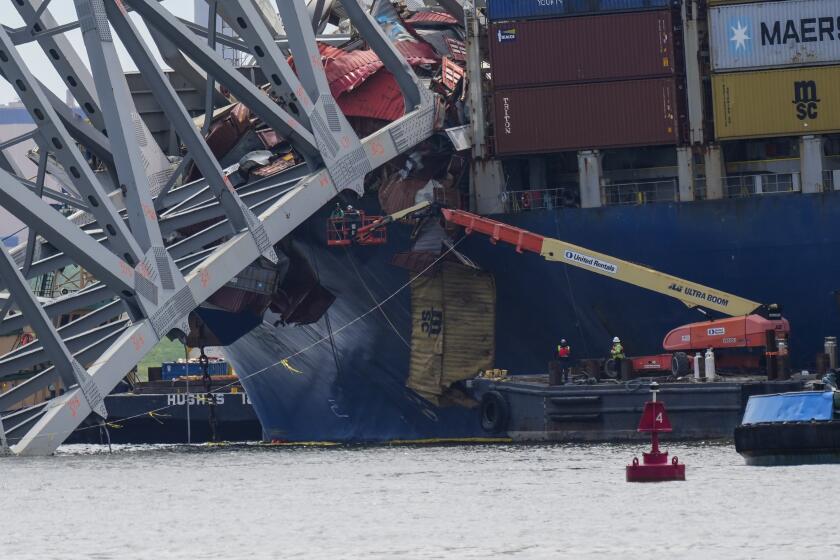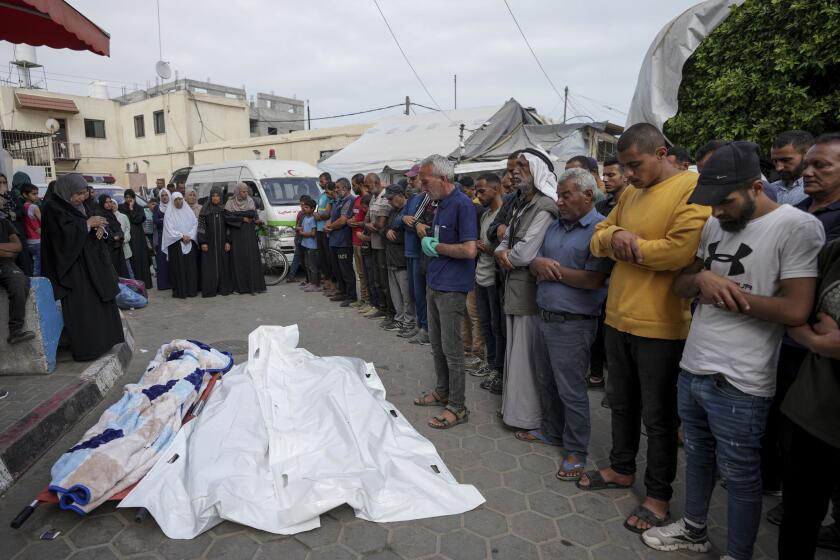Ramadi at Heart of Iraq Election Hopes
The pamphlet handed out by U.S. Marines and soldiers to residents here ahead of the national election draws on the ruinous experience of another volatile city in the Sunni Triangle.
“Thanks to the good people of Ramadi,” the pamphlet reads, “Ramadi is not sharing Fallouja’s fate.”
A picture of a masked insurgent holding two rocket-propelled grenade launchers drives home the point about Fallouja, which was virtually the capital of the Iraqi insurgency until U.S.-led forces invaded it in November.
Now U.S. and Iraqi officials hope the same “good people” of Ramadi will participate in the Jan. 30 election and provide the intelligence needed to thwart insurgents’ attempts to disrupt the balloting.
If the government and its American allies are going to pull off the election where Sunni Muslims are dominant, it will have to go well here in this provincial capital, an aging, deteriorating industrial center with 400,000 residents on the banks of the Euphrates River.
With Fallouja in virtual lockdown after the November offensive, Ramadi looms as the more significant test of whether U.S. and Iraqi forces can provide security and Sunni voters will ignore calls by some clerics to boycott the election.
Despite the efforts of officials in Washington to downplay the voting, saying it is only the first step in a long march to Iraqi self-government, U.S. officials here are candid in their assessment of Ramadi’s importance.
“From a symbolic and a political standpoint, conducting a successful election in Ramadi, the provincial capital, is critical,” said Brig. Gen. Joseph F. Dunford, assistant commander of the 1st Marine Division.
Late last week, Ambassador John D. Negroponte, Army Lt. Gen. Thomas F. Metz and Army Gen. George W. Casey, the top American commander in Iraq, visited division headquarters to meet with Dunford, division commander Maj. Gen. Richard F. Natonski and other Marine brass.
The officials discussed security plans for the days leading up to and including the election in Ramadi and other parts of Al Anbar province, which stretches about 300 miles from the outskirts of Baghdad to the Jordanian border.
Although overshadowed in media accounts by the Fallouja offensives in April and November, this city has seen intense guerrilla warfare at times since the U.S.-led invasion of the country in 2003. Until November, the Marine battalion that had suffered the most casualties in Iraq was the 2nd Battalion, 4th Regiment, which was stationed in Ramadi for seven months last year.
“I think Ramadi was even more dangerous than Fallouja,” said Marine Maj. Dan Whittman, whose patrol boat on the Euphrates was set ablaze by a rocket attack.
“In Fallouja, before November, they started shooting at you as soon as you entered the city limits,” Whittman said. “In Ramadi, they let you come in and then pick you apart, and they have good snipers.”
In October, the U.S. doubled the number of troops assigned to Ramadi, and security improved for a time. Now attacks are occurring almost daily again.
In recent weeks, several Iraqi police stations in the city have been destroyed by explosions. Late last week, rocket attacks were reported in residential areas as well as near U.S. compounds. Marines exchanged gunfire with suspected insurgents, but no U.S. casualties were reported in any of the incidents.
Nine militants beheaded an Iraqi soldier in broad daylight Friday and left a note warning other Iraqi troops to quit, the Reuters news agency reported, quoting witnesses.
Also on Friday, snipers rained fire on Ramadi’s government center, where U.S. and Iraqi officials were meeting to discuss the election and other city workers were trying to help residents with the day-to-day problems of employment and healthcare.
In preparation for the election, U.S. troops have raided numerous locations around Ramadi. In one night, 82 suspected insurgents were captured. The military said a load of anti-American literature and several caches of weaponry, including grenades, rockets and AK-47s, were seized.
Although they are among the few large cities in Al Anbar and are only 40 miles apart, Ramadi and Fallouja historically have gone their separate ways. Ramadi has been more tribal, with a tighter social structure. Fallouja was more hospitable to outsiders and served as a way station for travelers and merchants from Syria and Jordan.
The U.S. has attempted to exploit the rivalry and disdain many Ramadi residents feel toward Falloujans. The “good people” pamphlet, for example, is one of several “information operations” designed to play on their differences.
“We’re hearing some Ramadi residents telling us: ‘We don’t want a Fallouja here. We’re not Fallouja,’ ” said Col. John Coleman, chief of staff of the 1st Marine Expeditionary Force.
Lance Cpl. Rajai Hakki, who speaks Arabic and has served in Baghdad and Fallouja as well as here, finds Ramadi residents more perplexing than other Iraqis.
“As absurd as it sounds, they seem comfortable with our presence, even though there are attacks every day,” Hakki said. “It’s become the status quo.
“Everybody knows who the mujahedin are, but nobody wants to help us,” he said. “There’s just too much fear.”
More to Read
Start your day right
Sign up for Essential California for news, features and recommendations from the L.A. Times and beyond in your inbox six days a week.
You may occasionally receive promotional content from the Los Angeles Times.






